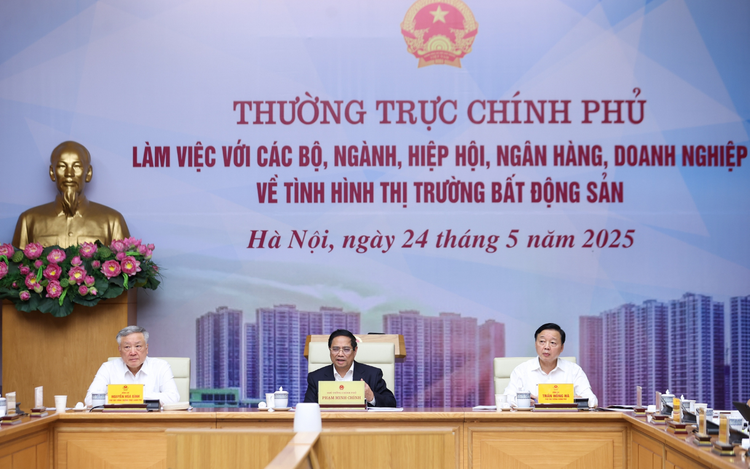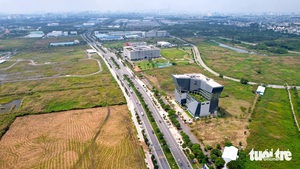
Prime Minister Pham Minh Chinh (C) chairs a meeting on the Vietnamese property market in Hanoi, May 24, 2025. Photo: Vietnam Government Portal
The directive was issued during a high-level meeting held on Saturday afternoon between the prime minister and representatives from key ministries, trade associations, banks, and businesses to evaluate the current condition of the property sector.
The tax policies are aimed at ensuring transparency, fairness, and stability in the local market, he emphasized.
PM Chinh called on all ministries, agencies, and local authorities to identify and resolve legal and administrative obstacles that hinder real estate development and inflate costs.
He also demanded stronger action against manipulation in land auctions and market speculation.
"There must be harsh sanctions on artificial pricing, hoarding, and exploitation that distorts the market and mislead the public,” he stated.
The Ministry of Construction was tasked with collaborating with local authorities to support stalled projects, develop state-regulated real estate trading centers, and issue incentives for essential infrastructure, especially for social housing.
Local authorities were instructed to make real estate data publicly accessible to ensure transparency and protect citizens from fraud.
Additionally, the government is considering eliminating certain administrative procedures, including investment approval requirements, to speed up project development.
Real estate supply ascends, bottlenecks remain
A report from the Ministry of Construction showed a positive trend in the first quarter, with a notable increase in housing projects compared to the same period last year.
Fourteen commercial housing projects were completed, providing over 3,800 units, a 40 percent year-on-year rise.
Moreover, 26 new projects with nearly 16,000 units were approved, marking a 44-percent surge.
Besides, as many as 59 projects with about 20,000 units were eligible for future sale, up 55 percent, while 994 projects are currently under construction, totaling nearly 400,000 units.
As for social housing, more than 1,300 plots nationwide have been designated for development, spanning over 9,700 hectares.
As part of a national plan to build one million affordable homes, 679 projects, with over 623,000 units, have been launched.
Of these, 108 have been completed, with 73,000 units, and 155 are under construction, with 132,000 units.
However, several market experts pointed to limited supply, misalignment in housing segments, and slow progress in social housing development.
Many projects are still facing legal bottlenecks tied to land, investment procedures, bidding laws, and zoning.
Other ongoing difficulties facing property developers are accessing capital and volatility in alternative investment channels such as gold, stocks, and corporate bonds.
Some 788 real estate projects across the country are currently stalled due to legal and financial hurdles.



Max: 1500 characters
There are no comments yet. Be the first to comment.